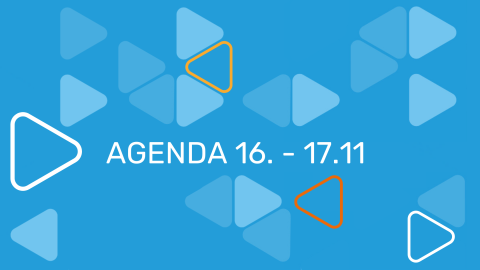Integration Conference 2023. From Security to Solidarity: Challenges of Integration in the Times of Crisis
WHY?
In the backdrop of global challenges, ranging from the recent COVID-19 pandemic to the raging war in Ukraine, lies the urgent need for holistic rethinking of the notions of security and solidarity. European nations, now more than ever, grapple with integration complexities, showcased not just by the strain of integrating war refugees and already present national minorities, but also by the nuanced balance of maintaining state security without compromising societal cohesion. The war's impact isn't just a geographic or political one—it extends to displaced individuals, carrying with them traumas and hopes, seeking solace in nations already navigating their own integration challenges.
WHAT?
This conference focuses on an in-depth exploration of integration-themed topics, providing a platform for discussions and best practices exchange, drawing from narratives both within and outside Europe. The conference speakers will be discussing:
- possible solutions to integration issues and interpretations of past lessons;
- traumas caused by the war in Ukraine and other challenges faced by displaced persons;
- security issues related to war refugees and asylum seekers, and strengthening the foundations for peaceful coexistence;
- long-term consequences of forced migration.
WHO?
The conference is designed for experts in the field of integration, policymakers, scholars, but also enthusiasts, practitioners, representatives from the third sector and of course the general public in Estonia and abroad. We welcome anyone who wish to contribute to discussions and actions in the integration field.
Conference Focus
The conference's topic reflects the complexity of an era when European countries one after another face multiple crises, from the COVID-19 pandemic to the war in Ukraine. Under these conditions, integration issues have become even more complex and urgent. The conference offers in-depth analysis and a platform for discussion, where experts, researchers, and policymakers meet to share perspectives and best practices, particularly as European countries have made significant strides in societal integration in the context of both the COVID-19 pandemic and the war in Ukraine.
Meanwhile, there's a need to rethink the balance between security and integration. European Union countries face the complex question of drawing the line between security and integration when Russian-speaking diasporas, asylum seekers, and immigrants are often viewed through the lens of risk. This approach raises the perceived level of threat among the majority and may, in turn, affect political decisions.
Crises expedite processes, making it crucial in countries like Estonia and Latvia to find ways to reform the education system, providing equal opportunities for both local ethnic minorities and new immigrants, while respecting their community identity yet integrating them into the majority's culture and language base.
Since all these topics—pandemic, war, security, and ethnic minority education—are divisive for society, the conference focuses not only on problems but also on opportunities for restoring cohesion and maintaining societal integrity. The conference consists of four interrelated panels: the first focuses on social and economic aspects of the current refugee crisis, the second on scientific and practical aspects of refugee integration, the third on the complicated relationship between the processes of securitization and social cohesion, and the fourth on the role of education reform and language learning in integration.
Through this interdisciplinary and multi-faceted approach, the conference aims to find solutions that could lead to a more stable and united future, despite current and future challenges.
Overview of the panels
Panel 1: Challenges of Forced Migration: Social and Economic Aspects
This panel delves into the social and economic dimensions of the refugee crisis, emphasizing the long-term consequences of forced migration. It seeks to explore how the war in Ukraine has complicated existing issues surrounding displaced persons, from their traumas to their economic integration. It will also scrutinize how these factors put immense pressure on social, educational, and healthcare systems in European countries.
Panel 2: Integration of War Refugees: Scientific Approach vs Practice
Examining both scientific and practical aspects of refugee integration, this panel aims to provide an in-depth analysis of how European countries have made strides in societal integration in the context of the war in Ukraine. It will contrast theoretical models with real-world examples, focusing on the "intricate craftsmanship" required to find a balance in addressing the needs of refugees. Discussions will consider how research can better inform practices on the ground, especially in the post-COVID era, where integration issues have become even more complex and urgent.
Panel 3: Social Cohesion and State Security: Where Is the Line?
The panel addresses the need to rethink the balance between state security and social cohesion, specifically in the context of Russian-speaking diasporas, asylum seekers, and immigrants. It examines how these groups are often viewed through the "lens of risk," which raises the perceived level of threat among the majority and may influence political decisions. The conversation will explore how to delineate the line between security and integration, striving for a harmonious coexistence that doesn't compromise state security.
Panel 4: Best Integration Practices for the European Union and beyond
This panel dives into the best integration practices within the European Union and beyond. As we grapple with the challenges of global events such as the pandemic and geopolitical crises, it's essential to evaluate the practices that sustain and strengthen our interconnected world. With insights from representatives of the international best practices network, this discussion will touch upon the role of education and delve into broader aspects of integration. This includes strategies that offer "equal opportunities for both local ethnic minorities and new immigrants" and ensure the preservation of community identity. This panel aims to discern solutions that can be universally applied, fostering resilience, unity, and harmony in our societies amidst various crises."
Contacts of organizer
Contact person
Ivan Polynin
Head of Research Activities
Integration Foundation






